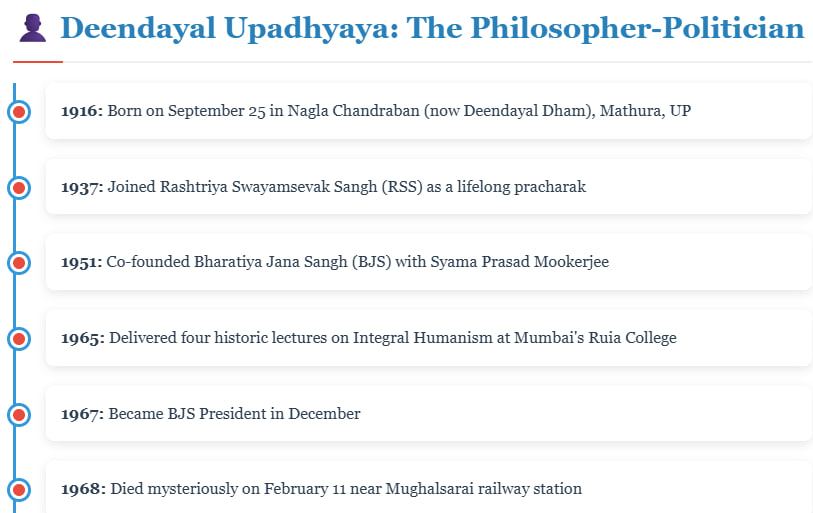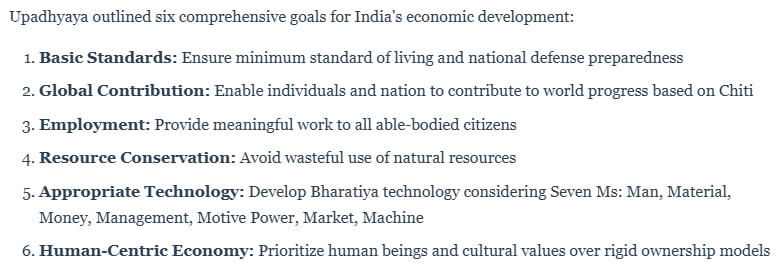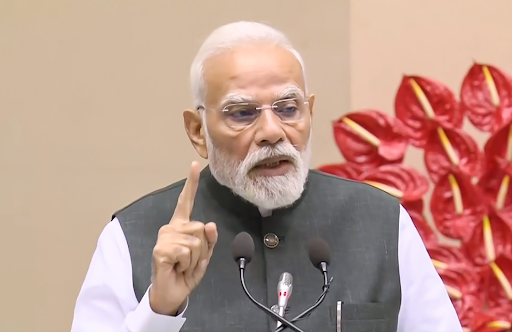



Deendayal Upadhyaya’s Integral Humanism, rooted in Daishik Shastra, offers an Indian alternative to Western ideologies. It integrates individual, society, nature, and the divine, emphasizing Dharma, Chiti, Antyodaya, and Swadeshi. Critiquing capitalism and socialism, it seeks holistic development, cultural identity, and equitable progress for all, especially the marginalized.

Copyright infringement not intended
Picture Courtesy: SUNDAYGUARDIANLIVE
Integral Humanism, rooted in Deendayal Upadhyay’s vision and detailed in Daishik Shastra.
Integral Humanism, or Ekatm Manavvad, is a political and social philosophy developed by Pandit Deendayal Upadhyaya, a key figure in the Bharatiya Jana Sangh (BJS), the predecessor of the BJP. He presented it in a series of lectures in Bombay (now Mumbai) in April 1965.
It was proposed as an indigenous Indian alternative to both Western capitalism and Marxist socialism/communism, which Upadhyaya believed were inadequate for India's socio-economic and cultural context.
 Roots of Integral Humanism
Roots of Integral Humanism
Its philosophical roots trace back to Daishik Shastra, a book by Badrishah Thulgharia, published in 1923.
Daishik Shastra outlines Bharatiya political thought, emphasizing cultural unity and national identity. Mahatma Gandhi and Bal Gangadhar Tilak praised it, with Gandhi calling it an “excellent book on Oriental politics.”
Upadhyaya built on Daishik Shastra’s ideas, adapting them into Ekatm Manavvad.
He also integrated Gandhian principles like Sarvodaya (progress for all), Swadeshi (self-reliance), and Gram Swaraj (village self-governance), but gave them a nationalist twist, prioritizing cultural values over individual interests.
He drew inspiration from Advaita Vedanta (non-dualism) by Adi Shankaracharya, which sees all existence as interconnected.
Holistic and Integrated Vision
The term "Integral" signifies the interconnectedness and indivisibility of various aspects of human life and the cosmos.
It emphasizes the integration of the individual (Vyashti), society (Samashti), creation/nature (Srishti), and the Supreme/Creator (Parameshti). Harmony among these four elements is seen as essential for well-being. Alienation or conflict arises when these are not in balance.
The Nature of the Human Being
Integral Humanism views the human being not just as an economic or political animal, but as a complex entity with four hierarchical attributes:
A good society, according to this philosophy, must cater to the needs and aspirations of all these aspects. Focusing only on material needs (body) is insufficient.
The Four-fold Objectives of Humankind (Purushartha Chatushtaya)
Upadhyaya drew from the traditional Hindu concept of the four legitimate aims of human life:
Integral Humanism asserts that while Moksha is the ultimate individual aim, societal organization should enable individuals to pursue Artha and Kama under the guidance of Dharma, which acts as the regulating principle ensuring that the desire of wealth and pleasure does not lead to societal degradation or exploitation.
Critique of Western Ideologies
Capitalism: Criticized for its excessive individualism, consumerism, materialism, tendency towards exploitation, and creation of economic disparities. It was seen as alienating humans from each other and from nature.
Socialism/Communism: Criticized for its denial of individual freedom, suppression of the human spirit, over-emphasis on class conflict, and materialistic interpretation of history, neglecting spiritual and cultural aspects. It was seen as reducing humans to mere cogs in a state machine.
Concept of Dharma
Dharma is central to Integral Humanism. It's not to be narrowly understood as "religion" but as the eternal principles or natural laws that sustain individuals, society, and the universe.
It encompasses ethics, duties, responsibilities, and righteousness that govern conduct and ensure societal harmony and order. Adherence to Dharma is seen as key to societal well-being.
Antyodaya
This is a socio-economic principle, which means the "upliftment of the last person in the queue."
Development and progress must be measured by how they impact the poorest and most marginalized sections of society.
The benefits of development should first reach those at the bottom of the socio-economic ladder. This resonates with Mahatma Gandhi's concept of Sarvodaya (upliftment of all).
Swadeshi and Decentralization
Swadeshi (self-reliance) emphasizes economic policies based on indigenous needs, resources, and traditional skills. It promotes domestic production and consumption, aiming for economic independence rather than blind imitation of foreign models.
Decentralization of political and economic power is advocated to ensure greater participation, accountability, and local control over resources, aligning with traditional village governance systems.
 Chiti
Chiti
Upadhyaya introduced the concept of "Chiti" as the "soul," of a nation. He believed that every nation has its own Chiti, which is its guiding principle, its cultural ethos, and its source of identity and strength.
National policies and development models should be in consonance with this Chiti. For India, this Chiti is seen as rooted in its ancient spiritual and cultural heritage.
Source:
|
PRACTICE QUESTION Q. What does the philosophy of Integral Humanism propose as a solution to contemporary problems like alienation, disenchantment, and societal polarization? A) Embracing Western liberal values more fully to promote individual self-gratification. B) Reverting to a purely materialistic pursuit of development, discarding spiritual values. C) Achieving balance and harmony through the integration of the individual, society, creation, and the Creator. D) Strengthening the Westphalian state model to impose order and uniformity. Answer: C Explanation: Integral Humanism, as propounded by Deendayal Upadhyaya, emphasizes a holistic and integrated approach to life and development. It seeks to balance material progress with spiritual and moral values. The philosophy critiques both Western capitalism (for its excessive individualism and materialism) and Marxist socialism (for its suppression of individual liberty and purely materialistic worldview), arguing they neglect essential aspects of human fulfillment. This is often expressed through concepts like the harmony of Vyashti (individual), Samashti (society), Srishti (creation/nature), and Parameshti (the Supreme or Creator). This integration aims to achieve balance and resolve issues like alienation and disenchantment. |





© 2026 iasgyan. All right reserved